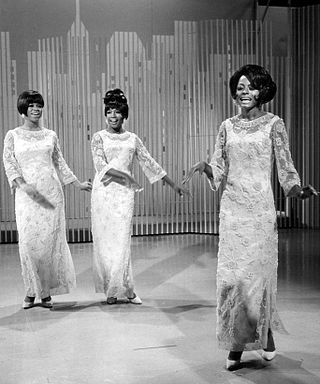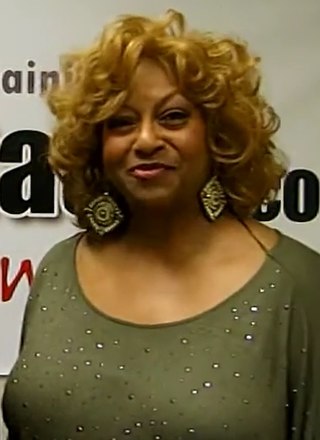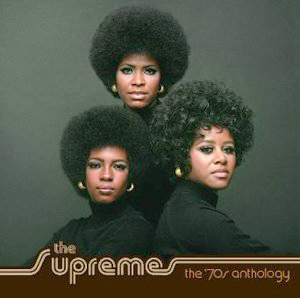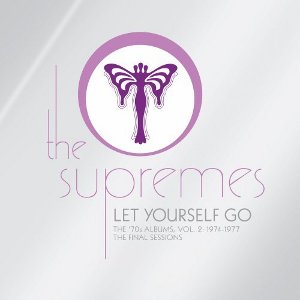Related Research Articles

The Supremes were an American girl group and a premier act of Motown Records during the 1960s. Founded as the Primettes in Detroit, Michigan, in 1959, the Supremes were the most commercially successful of Motown's acts and the most successful American vocal band, with 12 number-one singles on the Billboard Hot 100. Most of these hits were written and produced by Motown's main songwriting and production team, Holland–Dozier–Holland. It is said that their breakthrough made it possible for future African-American R&B and soul musicians to find mainstream success. Billboard ranked the Supremes as the 16th greatest Hot 100 artist of all time.

Diana Ross is an American singer and actress. She was the lead singer of the vocal group The Supremes, who became Motown's most successful act during the 1960s and one of the world's best-selling girl groups of all time. They remain the best-charting female group in history, with a total of twelve number-one hit singles on the U.S. Billboard Hot 100, including "Where Did Our Love Go", "Baby Love", "Come See About Me", "Stop! In the Name of Love", and "Love Child".

Mary Wilson was an American singer. She gained worldwide recognition as a founding member of the Supremes, the most successful Motown act of the 1960s and the best-charting female group in U.S. chart history, as well as one of the best-selling girl groups of all-time. The trio reached number one on Billboard's Hot 100 with 12 of their singles, ten of which feature Wilson on backing vocals.

Scherrie Ann Payne is an American singer. Payne is best known as a member and co-lead singer of the R&B/Soul vocal group the Supremes from 1973 until 1977. Because of her powerful voice and petite stature (5'2"), Payne is sometimes referred to as "the little lady with the big voice". Payne is the younger sister of singer Freda Payne. Payne continues to perform, both as a solo act and as a part of the "Former Ladies of the Supremes" (FLOS).

Cynthia Ann Birdsong is an American singer who became famous as a member of The Supremes in 1967, when she replaced co-founding member Florence Ballard. Birdsong had previously been a member of Patti LaBelle & The Bluebells.

Susaye Greene is an American singer and songwriter. She was the last official member to join the Motown girl group The Supremes, remaining in the group during its final year of existence from 1976 to 1977. She is a successful songwriter as well, having written hit records for Michael Jackson, Deniece Williams, and many others.
Velma Jean Terrell is an American R&B and jazz singer. She replaced Diana Ross as the lead singer of The Supremes in 1970.

Lynda Laurence is an American singer.

Dreamgirl: My Life as a Supreme is a 1986 autobiography that features the memoirs of Mary Wilson, one of the founding members of Motown singing trio The Supremes. It was a New York Times Best Seller for months, and remains one of the best-selling rock-and-roll autobiographies of all time. The title of the book is a reference to Dreamgirls, a 1981 Broadway musical loosely based on the lives and careers of the Supremes. Dreamgirl covers the Diana Ross-led years of the group. In 1990 Wilson penned a follow-up entitled Supreme Faith: Someday We'll Be Together that covers Wilson's life since 1970. Both books and a new afterword were included in a combined volume titled Dreamgirl & Supreme Faith: My Life as a Supreme in 2000.

The Supremes is a 2000 box set compilation of the material by Motown's most popular act of the 1960s, The Supremes. The set covers The Supremes' entire recording history, from its first recordings as The Primettes in 1960 to its final recordings in 1976.

The '70s Anthology is a 2002 two compact disc set of many of the songs recorded by the 1970s groupings of The Supremes. The set features 42 tracks, of which 10 had never been released, and 6 were appearing in extended or unedited forms.
Former Ladies of the Supremes, or FLOS, is a female vocal group that was originally formed in 1986 by former Supremes members Jean Terrell, Cindy Birdsong and Scherrie Payne. It has also included former members Lynda Laurence and Susaye Greene. Though they were not Supremes members, singers Sundray Tucker, Freddi Poole and Joyce Vincent have also sung with the group following the departure of Terrell.

High Energy is the twenty-eighth studio album by American girl group the Supremes, released in 1976 on the Motown label. The album is the first to feature Susaye Greene; former member of Stevie Wonder's Wonderlove; and is notable for featuring the last Billboard Hot 100 Top 40 pop hit for the group, "I'm Gonna Let My Heart Do the Walking". Of their 1970s releases, High Energy is the second-highest charting album on the US Billboard 200, the first being Right On (1970). In Canada, High Energy is the highest-charting Supremes album since TCB (1968).

The Supremes is the twenty-seventh studio album by The Supremes, released in 1975 on Motown Records.

Joyce Vincent Wilson is an American singer, best known as part of the group Tony Orlando and Dawn.
On June 12, 1977, The Supremes performed their final concert together at Theatre Royal, Drury Lane in London, England.

"I'm Gonna Let My Heart Do the Walking" is a disco-styled soul single composed by the Holland brothers Eddie and Brian, members of the former Holland–Dozier–Holland team and was released as a single by Motown vocal group The Supremes in 1976 on the Motown label. It was the first single since "Your Heart Belongs to Me" in 1962 to feature four Supremes. It is also notable for being the last top forty single the group would score before they disbanded in 1977.

The Supremes ('70s): Greatest Hits and Rare Classics is a 1991 compilation album by The Supremes, released on the Motown label. The compilation features a majority of the group's 1970's hits, as well as one solo song by Jean Terrell "I Had To Fall In Love", which was released in 1978 on A&M Records, and two solo tracks by Scherrie Payne, "When I Looked At Your Face" and "Another Life From Now". Three tracks "Everybody's Got the Right to Love" "Floy Joy" and "Automatically Sunshine" also appear in alternate versions.

Let Yourself Go, the follow-up box set to This Is the Story: The '70s Albums, Vol. 1 – 1970–1973: The Jean Terrell Years, comprises The Supremes' albums from 1974 to 1977, featuring original member Mary Wilson, longtime member Cindy Birdsong, newest member Scherrie Payne, and final Supreme Susaye Greene. Included in this set are The Supremes' final three studio albums released in their entirety on CD for the first time. Also included are several unreleased and alternate takes.
References
- ↑ Waddell, Ray (July 8, 2000). "TNA's Ross/Supremes Tour Achieves Modest Success". Billboard. p. 3.
- ↑ Waddell, Ray (July 22, 2000). "Supremes Tour Off?". Billboard. p. 6.